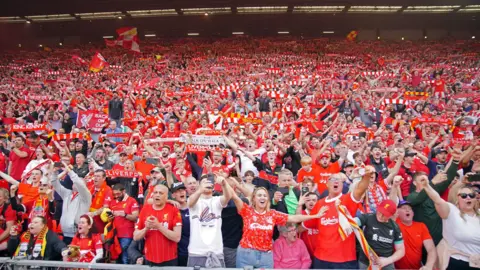In a recent discussion, Ian Byrne, the Labour MP for Liverpool West Derby, raised significant concerns regarding the affordability of football tickets for working-class supporters. He emphasized that the cost of attending top-flight matches has become prohibitively expensive, effectively excluding a large number of fans from the stadium experience. Byrne’s comments came during a House of Commons debate centered around the second reading of the Football Governance Bill, where he underscored the necessity of implementing measures to prevent working-class fans from being priced out of the game.
Byrne illustrated his point by referencing Liverpool’s triumphant capture of their 20th top-flight title, highlighting the disparity faced by many fans. He noted, “I witnessed thousands of working-class supporters, particularly youngsters, priced out of Anfield, with ticket prices skyrocketing beyond £1,000.” This statement poignantly encapsulates the distressing reality that financial barriers have increasingly shaped who can watch their beloved teams play, pushing dedicated fans away from the stands.
With such inflation in ticket prices, Byrne called for the establishment of an independent regulator tasked with overseeing club operations, particularly regarding ticket pricing policies. He argued that the regulator should ensure financial sustainability across clubs, protect their heritage, and facilitate engagement with fans. In support of his proposal, he expressed that current governance structures are insufficient to address the systemic issues that disproportionately impact those from working-class backgrounds.
The MP urged the Culture, Media, and Sport Secretary, Lisa Nandy, to consider two critical amendments aimed at reforming the current ticket pricing landscape. Firstly, he proposed that the independent regulator be involved in the decision-making process regarding ticket prices, alongside periodic updates provided through “State of Football” reports. This initiative would ensure fans have meaningful input into their club’s ticket policies, thereby promoting greater transparency and accountability.
Secondly, Byrne advocated for a thorough review of concessionary ticket prices across football, arguing that loyal fans of all ages should not be excluded from attending matches due to exorbitant fees. He reiterated that football is not just a sport but rather a vital part of community identity and cohesion. Emphasizing the threat posed by owners prioritizing profit over the sporting legacy, he stated, “We cannot allow the greed of some owners, who lack understanding of how important the working-class game is, to undermine the communities it should serve.”
Byrne’s dialogue was complemented by a representative from the Football Supporters’ Association (FSA), who echoed his sentiments. They expressed concerns that clubs are covertly diminishing the number of available season tickets, a strategy seen as an avenue to enforce higher prices for marquee matches. This tactic only exacerbates the divide between fans who can afford premium charges and those who cannot, effectively narrowing the audience for what is often dubbed the “people’s game.”
The Parliament’s discourse on these matters highlights an urgent need for reform in football governance, particularly with the proposed establishment of the Independent Football Regulator (IFR). This body would oversee clubs in the top five tiers of men’s football and aim to cultivate a sustainable and inclusive environment for all supporters.
Liverpool FC responded to some of the concerns raised by asserting that it had maintained stable ticket prices over the past eight years. The club confirmed that the cheapest tickets for matches in the Kop stand are priced at £39, a rate that has remained unchanged for nearly a decade and a half. However, even these prices can still be anxiety-inducing for many working-class fans, underlining the ongoing struggle to balance business interests with fan accessibility.
The broader implications of Byrne’s initiatives extend beyond Liverpool, as similar issues with ticket pricing resonate throughout the country and within various clubs. As fans continue to express their frustrations over the rising costs associated with live sports, the call for comprehensive reform is becoming increasingly relevant. Ultimately, the ongoing discussions reflect a crucial moment in the sporting landscape, where the voices of fans are paramount to shaping the future of football in an equitable manner.



